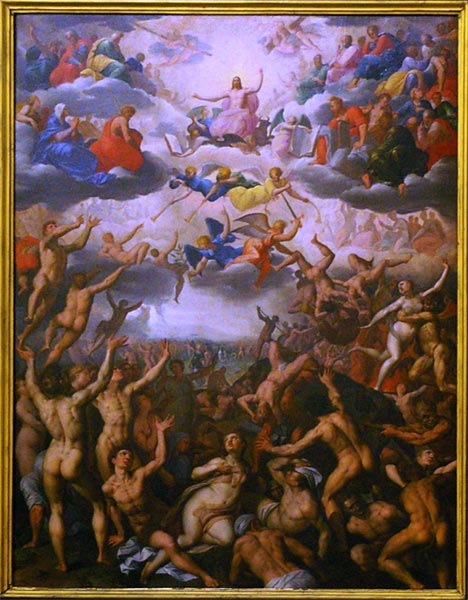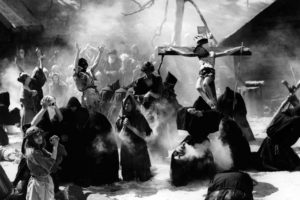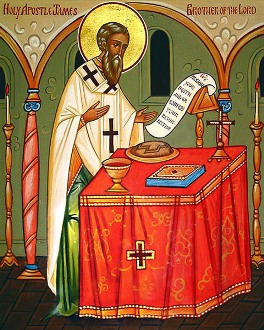The music for this Sunday connects the Second Coming of Christ with His coming in the Eucharist. It intensifies theme of the Advents of Christ that occur both now and at the end of time, and prepares us to look back at His earthly advent two millennia ago, in further preparation for His Advent into our souls and at the End of Time.
“Lo! He Comes with Clouds Descending.” Charles Wesley reworked an older hymn and made it an expansion of the prayer in the Our Father: “Thy Kingdom come.” Ralph Vaughan Williams harmonized the tune Helmsley for the 1906 English Hymnal.
The theme of the hymn is taken from Revelation 1:7: “Behold, he is coming with the clouds, and every eye will see him, every one who pierced him; and all tribes of the earth will wail on account of him. Even so. Amen.
Lo, He comes, with clouds descending,
once for our salvation slain;
thousand thousand saints attending
swell the triumph of his train:
Alleluia! Alleluia! Alleluia!
Christ the Lord returns to reign.
The cloud is used in scripture to signal the presence of God, who is dark with excessive light. Moses entered the cloud on Sinai, and on Tabor a cloud descended on Jesus at the Transfiguration.
Ev’ry eye shall now behold Him,
Rob’d in dreadful majesty:
Those who set at nought and sold Him,
Pierc’d and nail’d him to the tree,
Deeply wailing,
Shall the true Messiah see.
Some have seen anti-Semitism in this stanza, but the Scripture verse it is based on makes it clear that we, the sinners of all nations will wail when we see what we have done to God Himself through our sins.
Those dear tokens of His passion
still His dazzling body bears,
cause of endless exultation
to his ransomed worshipers;
with what rapture, with what rapture, with what rapture
gaze we on those glorious scars!
John “saw a Lamb standing, as though it had been slain” Rev 5:6. Those wounds, “the dear tokens of His passion,” inflicted by sinners, have saved the world.
Yea, amen! let all adore Thee,
high on Thine eternal throne;
Savior, take the power and glory,
claim the kingdom for Thine own:
O come quickly! O come quickly! O come quickly!
Thou shalt reign, and Thou alone.
The final stanza echoes 1 Cor 16:22, “Our Lord, come! Maranatha!”: “O come quickly! Christ the Lord returns to reign
A. Mozart (1756-1791): Dies irae. Mozart was working on the at the time of his death. He did not complete the score, and the sixth movement of the sequence, “Lacrimosa dies illa,” breaks off after eight bars. Years earlier, he had written to his father: “Young as I am, I never go to bed without thinking that possibly I may not be alive on the morrow; yet not one of the many persons who know me can say that I am morose or melancholy. For this happy disposition I thank my Creator daily, and wish with all my heart that it were shared by all my fellows.”
The tune of the Dies Irae is used frequently both classical music and in popular culture, including horror films:
Sleeping with the Enemy
Conan the Barbarian
Gremlins 2
The Lion King
T Ring
X Men
Duplex
Invasion of the Body Snatchers
Murder in the First
Metropolis
Nightmare before Christmas
Knowing
Inkheart.
Mozart’s “Lacrimosa” was used in The Sinner and The Big Lebowski.
As the mainline Protestant churches and the Catholic Church have largely abandoned the apocalyptic fear exemplified by the Dies irae, it was taken up by popular culture, divorced from its Christian context and ultimate hope for mercy.s the mainline Protestant churches and the Catholic Church have largely abandoned the apocalyptic fear exemplified by the Dies irae, it was taken up by popular culture, divorced from its Christian context and ultimate hope for mercy.
“Let All Mortal Flesh Keep Silence.” This ancient text is the Offertory hymn from the Liturgy of St. James. Jesus descends in the clouds of incense at the Eucharist, in which the smoke that filled the Temple at the Shekinah, at the presence of the Lord, is once again there at the throwing-open of the Holy of Holies, as God descends to feed His people with Himself.
“The King Shall Come When Morning Dawns.” This text was written by Scots Hymnologist John Brownlie (1859-1925) on ancient Greek models. It emphasizes the joy, the “endless bliss,” that we will feel when Jesus finally returns and reigns. The tune PICARDY comes from a book of French folksongs, Chansons Populaires des Provinces de France, published in 1860. Ralph Vaughan Williams paired it with this text for the 1906 English Hymnal.


